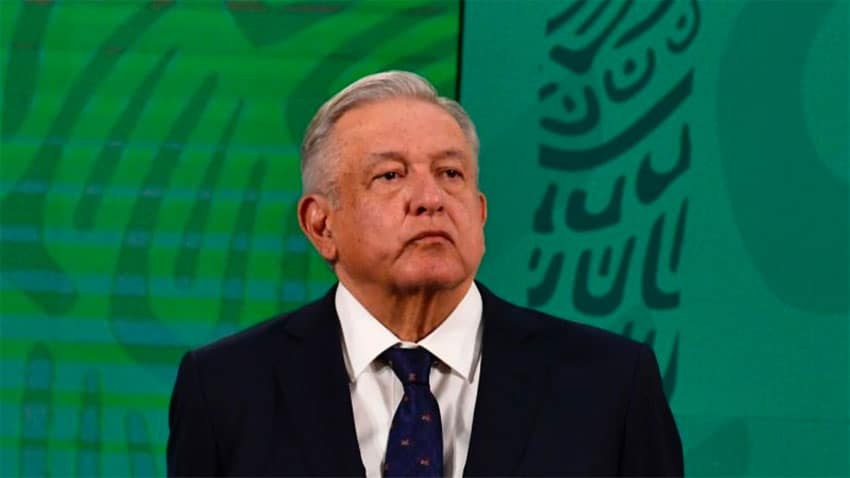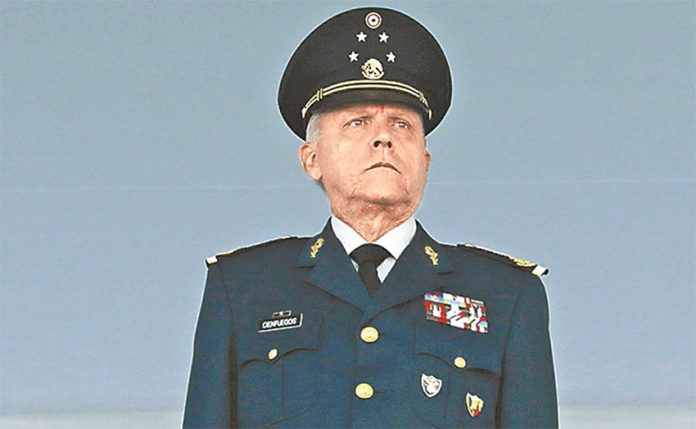The federal Attorney General’s Office (FGR) has exonerated former defense minister Salvador Cienfuegos of drug trafficking and money laundering charges less than two months after he returned to Mexico from the United States, where he was arrested last October.
Cienfuegos, army chief during the 2012-2018 government led by former president Enrique Peña Nieto, was detained in Los Angeles on October 15 on charges he colluded with and excepted bribe payments from the H-2 Cartel, a splinter group of the Beltrán Leyva Organization.
United States authorities alleged that Cienfuegos as defense minister conspired with the H-2 Cartel to smuggle thousands of kilograms of cocaine, heroin, methamphetamine and marijuana into the U.S.
But under pressure from Mexico, which implicitly threatened to restrict the activities of U.S. agents working here and expressed “profound discontent” over not being informed of the plan to arrest him, the United States dropped the charges against the 72-year-old retired general and granted Mexico its wish to conduct its own investigation.
However, there was broad skepticism in both the United States and Mexico that Cienfuegos would ever face trial, let alone be convicted, even though the U.S. said it had a strong case against him, including cell phone messages intercepted by the Drug Enforcement Administration (DEA) that allegedly incriminated the former army chief, who was apparently known to his alleged conspirators as the Godfather.
That skepticism was validated Thursday night when the FGR announced that it would not proceed with charges against him.
The Attorney General’s Office said it received the United States evidence against Cienfuegos and that the former defense minister presented his own evidence after being notified on January 9 of the charges he faced. The latter’s evidence, provided in a period of just five days, completely disproved allegations of wrongdoing, according to the FGR.
“The conclusion was reached that General Salvador Cienfuegos Zepeda never had any meeting with the criminal organization investigated by American authorities, and that he also never had any communication with them, nor did he carry out acts to protect or help those individuals,” it said in a statement.
The FGR also said that it found no proof that Cienfuegos used an electronic device to communicate with criminals while defense minister (United States authorities said he used a Blackberry to contact cartel members) or that he had issued orders that favored the H-2 Cartel. The U.S. had accused him of allowing it act with impunity, ordering operations against its rivals and helping it secure maritime transport to ship drugs to that country.
In addition, the FGR said that there was no evidence that the former army chief had received illegal income or that his wealth had grown abnormally while serving as a government official.
Speaking at his news conference on Friday, President López Obrador, whose administration is relying heavily on the armed forces for a range of traditionally non-military tasks, claimed that the United States fabricated evidence against Cienfuegos.

“The most important thing is truth and justice. So, the Attorney General’s Office resolved yesterday not to proceed with the accusation that was fabricated against General Cienfuegos … by the DEA,” he said.
“The FGR has acted because it was deemed that the evidence presented by the United States government … has no probative value … [in terms of] initiating a court case against General Cienfuegos.”
López Obrador accused the DEA of lacking professionalism and seeking to damage relations between Mexico and the United States. He committed to releasing full details of Mexico’s investigation into the general, whose arrest was deeply embarrassing for the Mexican government given that it has placed so much trust in the armed forces.
“We offer apologies to the United States government for acting in this way [releasing the FGR investigation]; they could say ‘how dare we disclose this document’ in which it is clear that the evidence they collected over many years is not solid,” López Obrador said.
The president stressed that the FGR acted independently but said his government supports its decision to drop the case.
“We maintain that impunity and of course corruption must be ended but … crimes cannot be invented. Nobody should act in this way,” he said.
López Obrador suggested that the arrest of Cienfuegos was politically motivated, noting that he was taken into custody just before the United States presidential election even though U.S. authorities had been investigating the general for years and he previously traveled to that country.
“Why was [his arrest] on the eve of the election? What was the message? Who did it come from? What was it that they were trying to do? Weaken the government of Mexico? Weaken the armed forces of Mexico? What happened?” the president asked?
Meanwhile, news of the FGR’s decision to drop the case against Cienfuegos was regarded as unsurprising by many observers.
“The United States returned General Salvador Cienfuegos to Mexico under unusual circumstances. It took Mexican authorities less than two months to decide that (shock!) Cienfuegos will not face any charges. What will the [United States] Justice Department say? Anything?” León Krauze, a journalist and news anchor, wrote on Twitter.
Security analyst Alejandro Hope opined that Cienfuegos’ exoneration was barely newsworthy, while Maite Azuela, a columnist for the newspaper El Universal, said the decision to drop the charges against him made a “clear mockery” of the federal government’s anti-corruption fight.
José Antonio Crespo, an academic and political analyst, offered a similar view.
“A lot of [López] Obrador supporters who believe (or believed) that AMLO’s fight against corruption is serious said that the return of Cienfuegos to Mexico would allow that belief to be proven. Maybe with this the penny will drop,” he tweeted.
Denise Dresser, a political scientist and columnist, wrote on Twitter that “the exoneration of Salvador Cienfuegos shows that the armed forces are untouchable.”
“They act above the law, they’re the true untouchables, they will continue [to operate] outside democratic scrutiny, they are really the ones that govern [Mexico] and have become the new mafia of power,” she said.
In the United States, Mike Vigil, a former DEA chief of international operations who said in November that “the chances of Cienfuegos being convicted in Mexico are slim to none,” contended that the exoneration of the former army chief “could be the straw that broke the camel’s back as far as U.S.-Mexico cooperation in counter-drug activities.”
(Despite the United States decision to drop charges against Cienfuegos, Mexico last month approved legislation that regulates the activities of foreign agents in Mexico, removes their diplomatic immunity and allows for their expulsion from the country. That legislation went into force today.)
“It was preordained that Mexican justice would not move forward with prosecuting General Cienfuegos,” Vigil said.
“It will greatly stain the integrity of its judicial system and despite the political rhetoric of wanting to eliminate corruption, such is obviously not the case. The rule of law has been significantly violated.”
After noting that the Mexican president has maintained a close, friendly relationship with United States President Donald Trump and held off on immediately congratulating Joe Biden for his win in November’s election, the Associated Press said in a report that “the restrictions on U.S. agents, and López Obrador’s veiled warnings to the Biden team to stay out of Mexican affairs, appeared to foreshadow thorny relations.”
“The Cienfuegos decision may only add to that perception,” AP added.
Source: Reforma (sp), El Universal (sp), Associated Press (en)
